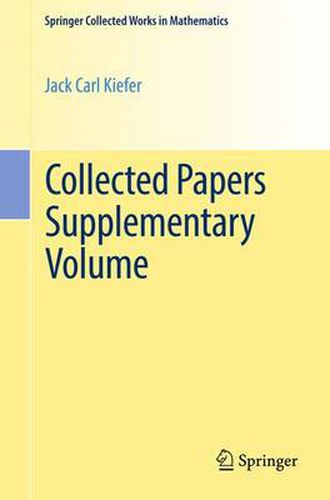Readings Newsletter
Become a Readings Member to make your shopping experience even easier.
Sign in or sign up for free!
You’re not far away from qualifying for FREE standard shipping within Australia
You’ve qualified for FREE standard shipping within Australia
The cart is loading…






This title is printed to order. This book may have been self-published. If so, we cannot guarantee the quality of the content. In the main most books will have gone through the editing process however some may not. We therefore suggest that you be aware of this before ordering this book. If in doubt check either the author or publisher’s details as we are unable to accept any returns unless they are faulty. Please contact us if you have any questions.
The commentaries in this volume provide reviews of selected papers from the three-volume Collected Papers of Jack Carl Kiefer. From the Preface of Volume III: The theory of optimal design of experiments as we know it today is built on a solid foundation developed by Jack Kiefer, who formulated and resolved some of the major problems of data collection via experimentation. A principal ingredient in his formulation was statistical efficiency of a design. Kiefer’s theoretical contributions to optimal designs can be broadly classified into several categories: He rigorously defined, developed, and interrelated statistical notions of optimality. He developed powerful tools for verifying and searching for optimal designs; this includes the averaging technique … for approximate or exact theory, and patchwork … for exact theory… Kiefer and Wolfowitz provided a theorem now known as the Equivalence Theorem. This result has become a classical theorem in the field. One important feature of this theorem is that it provides a measure of how far a given design is from the optimal design. He characterized and constructed families of optimal designs. Some of the celebrated ones are balanced block designs, generalized Youden designs, and weighing designs. He also developed combinatorial structures of these designs.
$9.00 standard shipping within Australia
FREE standard shipping within Australia for orders over $100.00
Express & International shipping calculated at checkout
This title is printed to order. This book may have been self-published. If so, we cannot guarantee the quality of the content. In the main most books will have gone through the editing process however some may not. We therefore suggest that you be aware of this before ordering this book. If in doubt check either the author or publisher’s details as we are unable to accept any returns unless they are faulty. Please contact us if you have any questions.
The commentaries in this volume provide reviews of selected papers from the three-volume Collected Papers of Jack Carl Kiefer. From the Preface of Volume III: The theory of optimal design of experiments as we know it today is built on a solid foundation developed by Jack Kiefer, who formulated and resolved some of the major problems of data collection via experimentation. A principal ingredient in his formulation was statistical efficiency of a design. Kiefer’s theoretical contributions to optimal designs can be broadly classified into several categories: He rigorously defined, developed, and interrelated statistical notions of optimality. He developed powerful tools for verifying and searching for optimal designs; this includes the averaging technique … for approximate or exact theory, and patchwork … for exact theory… Kiefer and Wolfowitz provided a theorem now known as the Equivalence Theorem. This result has become a classical theorem in the field. One important feature of this theorem is that it provides a measure of how far a given design is from the optimal design. He characterized and constructed families of optimal designs. Some of the celebrated ones are balanced block designs, generalized Youden designs, and weighing designs. He also developed combinatorial structures of these designs.